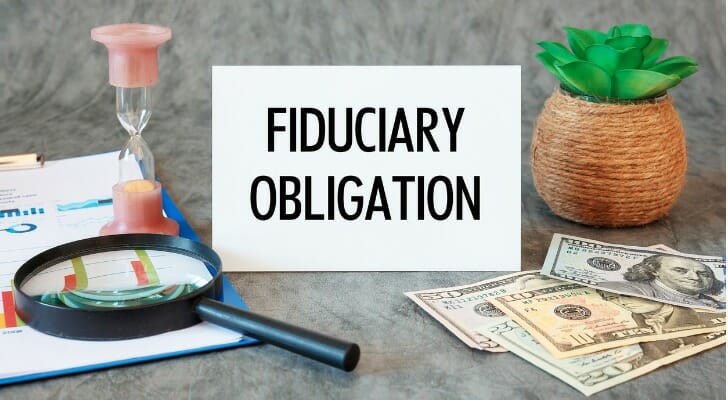Before committing to a financial advisor, it helps to know whether that professional is a fiduciary. Fiduciaries must act in a client’s best interest at all times, while brokers follow a separate standard under Regulation Best Interest, which applies only when making specific recommendations. While the titles may sound interchangeable, they reflect different legal standards and responsibilities.
A trusted financial advisor could help you plan for retirement and select investments that align with your financial goals. Find a qualified advisor today.
What Is a Fiduciary?
Legally speaking, a fiduciary is someone who is required to act in the best interest of someone else. Fiduciaries have a bond of trust with another person (called the beneficiary or principal) and have a legal obligation to act for the beneficiary’s benefit and not their own. Banks, firms and individuals can all act as fiduciaries, but not every service or person is bound by law to represent your best interests.
Are All Financial Advisors Fiduciaries?
Not all financial advisors are fiduciaries. Those registered as investment advisors with the SEC or state regulators have a fiduciary duty to act in their clients’ best interests, including disclosing conflicts and avoiding self-serving recommendations. Brokers, on the other hand, operate under Regulation Best Interest, which applies only when making recommendations and allows for commission-based compensation.
If you’re looking for a financial advisor, consider one who is a fiduciary, sometimes called a fiduciary financial advisor.
A fiduciary is less likely to recommend products that pay higher commissions but don’t match your needs. Non-fiduciary advice can lead to higher fees, misaligned investments and lower long-term returns, particularly if recommendations favor the advisor’s incentives over your financial goals.
How Can You Be Sure Your Financial Advisor Is a Fiduciary?
Because the laws governing the financial services industry are complex and specific, there are a few ways in which you can be sure your financial advisor is a fiduciary.
First, you could simply ask. Most advisors will respond candidly if they are fiduciaries or not. There is even an organization, the National Association of Personal Financial Advisors (NAPFA), which requires affiliated financial advisors to be fee-only fiduciaries.
Second, you could verify if your financial advisor is certified or registered with certain groups or governing bodies.
A registered investment advisor (RIA) is an individual or firm registered with the SEC or a state regulator. As such, RIAs have a fiduciary relationship with their clients. RIAs must disclose all conflicts of interest and outside business activities in their Form ADV. However, disclosure alone satisfies the legal requirement—an RIA may still recommend options that benefit their own business.
On the other hand, a Certified Financial Planner™ (CFP®) is a professional certified by the CFP Board who has passed extensive training and exams. CFPs are held to stringent standards and must uphold their fiduciary relationship with financial-planning clients or they will lose their certification.
A chartered financial analyst (CFA) is another professional who has undertaken extensive training in investment management. Charterholders are also held to an ethical code that imposes a fiduciary relationship between the CFA and investment management clients. Both CFPs and CFAs will likely disclose their fiduciary obligations to their clients without prompting.
When Fiduciary Duty Applies in Practice
Fiduciary duty applies based on the role a financial professional is performing, not the title they use. A person may act as a fiduciary when providing ongoing investment advice or managing assets under an advisory agreement, but not when selling a commission-based financial product. The legal standard depends on the service being delivered at that moment.
Registered investment advisors are fiduciaries when giving advice or managing client assets. In that role, they must prioritize client interests, disclose conflicts and base recommendations on the client’s full financial situation. Brokers and insurance agents, by contrast, operate under Regulation Best Interest or state insurance rules, which apply only to specific recommendations and allow compensation tied to product sales.
Some professionals operate in both capacities. These dual-registered advisors may shift between fiduciary advice and non-fiduciary transactions, sometimes within the same firm. In those cases, disclosure documents outline when the standard changes, though the transition may not be obvious during a conversation.
For clients, the key issue is knowing which standard applies to a recommendation. That requires clarity about whether advice is ongoing or transactional, how the professional is being paid and whether the recommendation is part of a broader financial plan or a standalone product decision.
Bottom Line
Fiduciaries must act in your best interest, but the term “financial advisor” carries no legal standard on its own. You should always ask if a potential financial advisor is a fiduciary, and you can verify this by checking the advisor’s Form ADV, which should disclose potential conflicts of interest. Certain professional credentials and affiliations may also signal fiduciary status.
That distinction becomes especially important when evaluating how an advisor defines and applies their duty to you.
“While any advisor can tell you that they will act in your best interest, a legal fiduciary standard requires them to,” says Brandon Renfro, CFP®, RICP, EA.
Brandon Renfro, CFP®, RICP, EA, provided the quote used in this article. Please note that Brandon is not a participant in SmartAsset AMP, is not an employee of SmartAsset and has been compensated. The opinion voiced in the quote is for general information only and is not intended to provide specific advice or recommendations.
Tips for Building Wealth
- Not sure what investments and strategies will help you retire early? For a solid, long-term financial plan, consider speaking with a financial advisor. SmartAsset’s free tool matches you with vetted financial advisors who serve your area, and you can have a free introductory call with your advisor matches to decide which one you feel is right for you. If you’re ready to find an advisor who can help you achieve your financial goals, get started now.
- Use SmartAsset’s free investment calculator to get a good estimate of how to grow your money over time.
Photo credit: ©iStock.com/FG Trade, ©iStock.com/Vladislav Chorniy, ©iStock.com/Andrei Sauko


